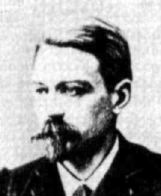

Thomas Stieltjes started his studies at the Polytechnical School of Delft in 1873, but spent his student years reading Gauss and Jacobi in the library rather than
attending lectures, resulting in many failed examinations. Instead,
Stieltjes became assistant at Leiden Observatory in 1877.
Perhaps the most significant mathematical event in Stieltjes' life was his correspondence with Hermite. Originally, the conversations concerned celestial mechanics.
However the correspondence turned quickly to mathematics and Stieltjes began to devote all his spare time to mathematical research.
In 1883, he married, and his wife strongly encouraged him to stop his observational work to do mathematics. He was asked to substitute at the University of Delft, and he lectured on analytical and descriptive geometry. This confirmed what
must have been becoming increasing clear in Stieltjes' mind, that mathematics was the only possible career for him. He resigned his post at the observatory. He applied for a chair in Groningen, but did not receive it because of his lack of qualifications. Hermite arranged for Stieltjes to get an honorary degree at Leiden University, but word did not reach him in time for the cerimony.
Stieltjes went with his family to Paris in 1885, and in the same year he was elected to the Royal Academy of Sciences in Amsterdam. He received his
doctorate of science in 1886 for a thesis on asymptotic series. In the same year Stieltjes was appointed to the University of Toulouse, being appointed to a chair in 1889.
Stieltjes worked on almost all branches of analysis, continued fractions and number theory. He is often called "the father of the analytic theory of continued fractions" for his work in this area. In 1894, he published a beautifully written work of major importance on the continued fractions.
His work on continued fractions was awarded the Ormoy Prize in 1893.
Stieltjes' work is also seen as an important first step towards the theory of Hilbert spaces. Also important is his work on divergent series and discontinuous
functions. Stieltjes also contributed to ordinary and partial differential equations, the gamma function, interpolation, and elliptic functions.
He is best remembered for the Stieltjes integral which he introduced while solving a problem involving moments.